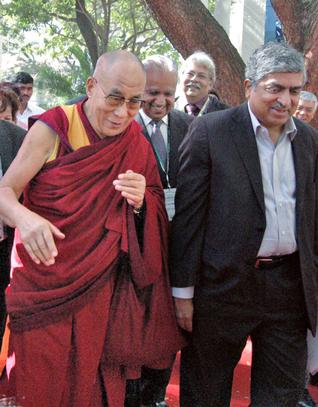Bangalore: Tibetan spiritual leader the Dalai Lama on Sunday lauded the work of Christian missionaries in the area of education and health in the remotest corners of the world, but advised them to desist from conversion.
Speaking at the national convention of the principals of Anglo-Indian schools, he said religions grow out of specific cultural and social contexts and it was “logically better to keep to one’s own traditions.”
Conversion could sometime lead to conflict between people and within a person, he said, and added that he would never preach Buddhism in a non-Buddhist country.
India’s guest
The Dalai Lama said he had the opportunity to meet people of many faiths as the “longest staying guest of the Indian government” and realised that different philosophical views had been developed to suit different cultures and mental dispositions, but essentially to emphasise tolerance and forgiveness.
He emphasised the need to achieve peace as something necessary for a “social animal” and not necessarily as a religious practice. He said that this was increasingly essential in an interconnected world where “each individual’s future depends on the wellbeing of the entire humanity.”
‘Respect non-believers’
Recalling the materialist Indian philosophical tradition of Charvakas, the Dalai Lama said there was a need to respect the non-believers too. He said the word “secular” in the Indian context was “not negative” since it was about respect for all faiths and non-religious philosophical systems too, but not their negation. The path to tolerance and peace, he said, was through education and not through religious preaching. He, however, said modern education tended to emphasis materialism leading to unhappiness and anger.
Delivering the keynote address, Chairman of the Unique Identification Authority of India (UIDAI) Nandan Nilekani said education should prepare children to “relearn” constantly to adapt to changing times. He said that the “era of lifetime job and career is ending” and education should equip a student to handle these changes by teaching them to be curious and innovate.
He said there was increasing democratisation of aspiration and ambition among different classes of people. This could be turned into an opportunity, but could also prove destructive if the aspirations were not nurtured, leading to frustrations, he added.

